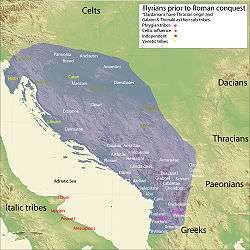
Illyria
In classical antiquity, Illyria (Ancient Greek: Ἰλλυρία or Ἰλλυρίς,Latin: Illyria, see also Illyricum) was a region in the western part of the Balkan Peninsula inhabited by the Illyrians.
The prehistory of Illyria and the Illyrians is known from archaeological evidence. The Romans conquered the region in 168 BC in the aftermath of the Illyrian Wars.
The Roman term Illyris (distinct from Illyria) was sometimes used to define an area north of the Aous valley, most notably Illyris proper.
Mythology
In Greek mythology, the name of Illyria is aetiologically traced to Illyrius, the son of Cadmus and Harmonia, who eventually ruled Illyria and became the eponymous ancestor of the Illyrians. A later version of the myth identifies Polyphemus and Galatea as parents of Celtus, Galas and Illyrius. The second myth could stem perhaps from the similarities to Celts and Gauls.
Kingdoms
The earliest recorded Illyrian kingdom was that of the Enchele in the 8th century BC. The era in which we observe other Illyrian kingdoms begins approximately at 400 BC and ends at 167 BC. The Autariatae under Pleurias (337 BC) were considered to have been a kingdom. The Kingdom of the Ardiaei began at 230 BC and ended at 167 BC. The most notable Illyrian kingdoms and dynasties were those of Bardyllis of the Dardani and of Agron of the Ardiaei who created the last and best-known Illyrian kingdom. Agron ruled over the Ardiaei and had extended his rule to other tribes as well. As for the Dardanians, they always had separate domains from the rest of the Illyrians.
Illyria (disambiguation)
Illyria or Illyrian may refer to:
History
Culture
Illyria (software)
Illyria is the name for a piece of software running in interpreted mode under Lisp programming language. It is primarily used in educational institutions to demonstrate the principles of inference engines.
Numeral (linguistics)
In linguistics, a numeral is a member of a word class (or sometimes even a part of speech) designating numbers, such as the English word 'two' and the compound 'seventy-seven'.
Identifying numerals
Numerals may be attributive, as in two dogs, or pronominal, as in I saw two (of them).
Many words of different parts of speech indicate number or quantity. Quantifiers do not enumerate, or designate a specific number, but give another, often less specific, indication of amount. Examples are words such as every, most, least, some, etc. There are also number words which enumerate but are not a distinct part of speech, such as 'dozen', which is a noun, 'first', which is an adjective, or 'twice', which is an adverb. Numerals enumerate, but in addition have distinct grammatical behavior: when a numeral modifies a noun, it may replace the article: the/some dogs played in the park → twelve dogs played in the park. (Note that *dozen dogs played in the park is not grammatical, so 'dozen' is not a numeral.)
The Brian Jonestown Massacre discography
The discography of The Brian Jonestown Massacre (a San Francisco, CA based, neo-psychedelic band) consists of fourteen studio albums, thirteen EPs, five live albums, five compilation albums and ten singles, as well as appearing on various artist releases and soundtracks. They have one rockumentary (Dig!) to their credit and a DVD release of their music videos entitled Book of Days. Their music has been released by Bomp!, TVT and Tee Pee Records, among others.
Studio albums
EPs
Singles
Compilations
Videos
Live albums
Multiple-band Compilations
The BJM have been featured on the following multiple-band compilations:
In 1993 Bomp! and Tangible Records co-released a box set of 6 singles, each by a different San Francisco "psych" band. The bands were apparently handpicked by Anton Newcombe himself, and it is rumored that he also produced the music. Besides the Brian Jonestown Massacre, other bands featured included Orange, Nebtwister, and Hollowbody.

List of Code Geass characters
Code Geass: Lelouch of the Rebellion (コードギアス 反逆のルルーシュ, Kōdo Giasu: Hangyaku no Rurūshu) and its sequel series Code Geass: Lelouch of the Rebellion R2 (コードギアス 反逆のルルーシュR2, Kōdo Giasu Hangyaku no Rurūshu Āru Tsū) are Japanese anime made by Sunrise, directed by Gorō Taniguchi, and written by Ichirō Ōkouchi. The series focus around a former prince of the Holy Britannian Empire, Lelouch Lamperouge, who obtains a mysterious power known as Geass and uses said power to destroy the Holy Britannian Empire, an imperial monarchy that possesses one third of the world and has recently conquered Japan, and to discover the truth behind his mother's death, as well as the various people that he encounters as he heads toward those goals.
This is a list of characters, minor and major, appearing in both Code Geass: Lelouch of the Rebellion, its sequel series, and/or the core series' spin-offs and products. The fictional characters in Code Geass: Lelouch of the Rebellion were designed by the manga studio Clamp.
Shades (1999 film)
Shades is a 1999 Belgian film directed by Erik Van Looy and written by Looy, Paul Breuls and Guy Lee Thys. The story is loosely inspired on the Belgian murderer Freddy Horion and his escape from prison in 1982.
Music for the film was composed by Alex Callier of Belgian band Hooverphonic, who performed the theme of the film.
Cast
External links
Podcasts:

